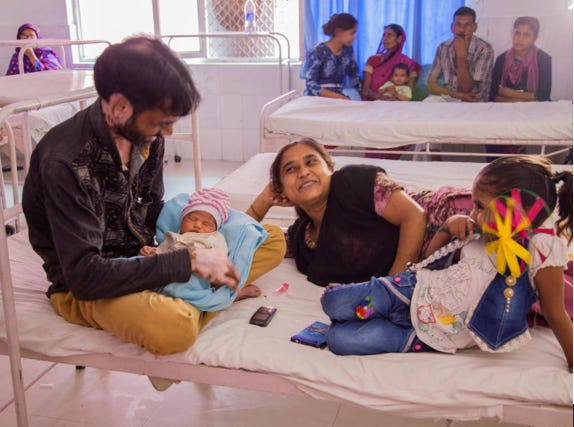It's Fathers' Turn Now to Help Close the Breastfeeding Gap
Author: ZealGrit Foundation
Reema was crouched beside a mud stove, balancing a tea kettle with one hand and her 4-month-old baby with the other. When we asked gently, “Didi, do you always hold your baby like this while working, or is today an exception? Does his father or someone else in the family not help you?” She laughed, not with humour, but with resignation.
We then asked, “Why don’t they help?” Reema explained that the father works during the day and says he doesn’t know how to handle a baby or what to do if the child starts crying. So she manages everything on her own, holding the baby all day and adjusting her routine completely around his needs. She sleeps when he sleeps and eats while feeding him; that’s simply how her days unfold. Worse, if Reema is busy feeding the baby and the tea boils over on the stove, she is called “careless.”
Reema isn’t alone. During our community visits, we have seen many other women, including mothers working in the fields, struggling to balance their jobs for daily wages, their babies, and household responsibilities.
When we think of breastfeeding, we often picture a smiling mother and her baby. But this image is incomplete. Picture the mother feeding her child while the father cooks a meal or folds laundry nearby. This is a complete picture of care and support where parenting is a daily practice.
Yet, most fathers remain on the margins of caregiving, not because they don’t care, but because they have rarely been encouraged to participate in caregiving. In most places, society continues to view childrearing as a woman’s domain, especially in the critical first 1,000 days of life, when breastfeeding is vital for a child’s growth and the mother’s own recovery.
The father’s role in supporting breastfeeding is both obvious and overlooked. The growing body of research shows that when fathers actively assist with maternal rest, nutrition, household tasks, and baby care, breastfeeding rates increase, and maternal stress decreases. Their involvement boosts mothers’ confidence in breastfeeding and increases the likelihood of sustained breastfeeding. Additionally, fathers who engage in caregiving help foster a stronger bond with their children, creating a positive family dynamic and relieving the mother’s burden. This collaborative approach promotes a healthier, more supportive environment for both mother and the child.
Here are some of the many doable ways in which a father can contribute, depending on the context:
Fathers can start by learning about breastfeeding—the benefits, proper latching techniques, and recognising the baby’s hunger cues. This knowledge enables him to provide informed support to the baby without being dependent on the mother. They can visit anganwadi centres, seek help from ASHA workers, or healthcare centres.
Small actions can make a significant difference. Fathers can ensure the mother stays hydrated by keeping water bottles filled and within reach and reminding her to take medications (if any) on time.
Sharing tasks, such as laundry, cleaning, meal preparation, and diaper duties, can lighten the mother’s load and provide her with much-needed rest.
Taking alternate turns with nighttime baby care allows the mother to get enough sleep. For couples using milk pumps, fathers can help by preparing bottles and cleaning pump parts, making the process less stressful for the mother.
Spending quality time with the baby strengthens the father-child bond. Activities like talking, singing, reading, or helping with bedtime routines are excellent ways to connect with the baby.
Emotional support is crucial. Offering understanding, reassurance, and being vigilant for signs of postpartum depression can significantly impact the mother’s well-being. It can be as basic as asking the mother how they feel and where support can be extended.
So there’s definitely a space that fathers can positively contribute. While breastfeeding may be biological, sustaining it takes a community, and that starts with fathers and the family members.
Fathers are not simply bystanders in the breastfeeding journey; through active involvement, they can help close the gap in breastfeeding support and contribute to healthier family outcomes.
Note: this blog was originally published at ZealGrit's website.
Have stories, insights, or case studies on health, nutrition, WASH, child protection, or social behaviour change? We would love to hear from you. Reach out at arpita.d@zealgrit.com.
To join Poshan Ghar, click here and be a part of a diverse and dynamic community!
Follow Poshan Ghar on LinkedIn, Facebook, Twitter, Instagram, and YouTube.
P.S. Enjoying this content? Subscribe directly to receive future updates by clicking below.





